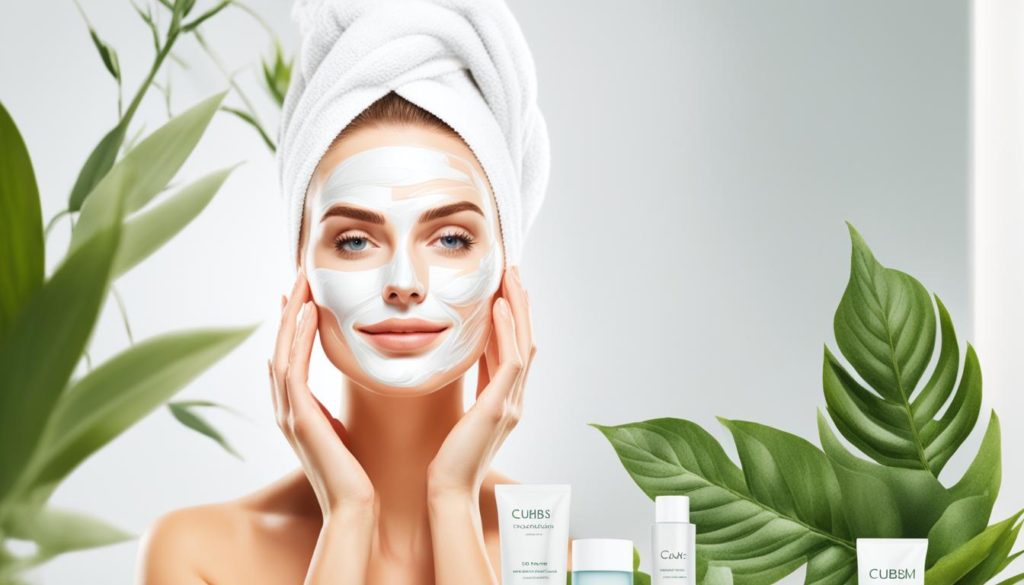Did you know that over 50 million Americans deal with acne yearly? It’s the most common skin issue in the United States. This large number shows how much we need good ways to stop acne. In our detailed clear skin guide, we’re going to look at how to prevent acne with a whole-person approach. We’ll make sure you have every tool you need to keep your skin clear of acne.
We’ll go over important tips and ways to keep your skin healthy, clear up myths about acne, and talk about why it’s important to tackle acne from all angles. We’ll help you understand acne’s causes and myths, pick the right products, change your diet, and use natural remedies. Our guide is like a map leading you to clearer skin.
Key Takeaways
- Understanding the causes and myths of acne is essential for effective prevention.
- A consistent skincare routine plays a crucial role in maintaining clear skin.
- Selecting the right skincare products can make a significant difference.
- Diet has a significant impact on acne prevention.
- Natural remedies can complement traditional acne prevention strategies.
- Hydration and lifestyle changes are also important for acne-free skin.
Understanding Acne: Causes and Myths
Acne is a skin issue that affects many people. To beat acne, it’s key to know why it occurs. We see factors like hormones, bacteria, and skin inflammation. It’s also crucial to correct myths about acne. This ensures we don’t follow wrong treatments.
What Causes Acne?
Acne has many causes, from hormones to the environment. Things like puberty, pregnancy, and periods change hormone levels. This leads to more sebum and blocked pores, causing inflammation. Bacteria known as Propionibacterium acnes make it worse, causing redness and swelling.

Your family history affects your acne risk. If your parents had severe acne, you might too. Pollution and diet also play a part in causing acne.
Common Myths About Acne
There are many myths about acne. One myth says eating chocolate or greasy foods causes acne. Yet, no clear link exists between these foods and acne. Another myth is that only teens get acne. But adults face it too, due to hormone changes and the environment.
Some think poor hygiene is to blame for acne. But, over-washing or scrubbing can irritate the skin more. Another myth claims the sun can help clear acne. But sun exposure can damage the skin and worsen acne.
Knowing the truth about these acne myths helps you choose better skincare habits.
The Importance of a Consistent Skincare Routine
A consistent skincare routine is key to clear, healthy skin. It helps in acne prevention and boosts skin health. It’s about more than just using products. It’s choosing the right products for the right times. This includes daily cleaning and exfoliating to fight acne.

Daily Cleansing Tips
Cleansing your face every day is crucial for avoiding acne. It removes oil, dirt, and other impurities. This stops pores from getting blocked, which can lead to breakouts. Pick a gentle cleanser for your skin type to use in the morning and at night. Don’t scrub too hard to avoid irritating your skin and making acne worse.
The Role of Exfoliation in Acne Prevention
Exfoliating is vital for preventing acne. It removes dead skin that can block pores and aids in new skin growth. Keep your skin bright and smooth by using a mild exfoliant once or twice a week. Doing so prevents breakouts and makes other skincare products work better by going deeper into the skin.
| Step | Description | Frequency |
|---|---|---|
| Daily Facial Cleansing | Use a gentle cleanser to remove impurities and oil | Twice daily |
| Exfoliation | Employ a mild exfoliant to shed dead skin cells | 1-2 times weekly |
Choosing the Best Products for Acne Prevention
Finding the right skincare for acne can change everything. It’s important to know what ingredients are in products. Look for items labeled non-comedogenic. These won’t block your pores.
Key ingredients to hunt for are salicylic acid and benzoyl peroxide. Salicylic acid keeps your skin clear by removing dead cells. Meanwhile, benzoyl peroxide fights off the bacteria that cause acne.
| Ingredient | Benefits | Suitability |
|---|---|---|
| Salicylic Acid | Exfoliates, clears pores | Best for blackheads and whiteheads |
| Benzoyl Peroxide | Kills bacteria, reduces inflammation | Effective on inflamed pimples |
For those picking out acne care, always seek out non-comedogenic and doctor-recommended products. These choices are trusted to be both safe and useful for skin prone to acne. Picking the right ingredients helps you control and avoid future breakouts.
Diet and Acne: Foods to Include and Avoid
Right dietary habits can greatly improve your skin health and help reduce acne. It’s vital to choose an anti-inflammatory diet. It’s also important to watch the glycemic index of what you eat for clearer skin.
Acne-Fighting Foods
For better skin health, add these acne-fighting foods to your meals:
- Berries – Full of antioxidants that fight inflammation.
- Leafy Greens – Spinach, kale, and others are loaded with skin-supporting nutrients.
- Fatty Fish – Salmon and mackerel contain omega-3 fatty acids, great for fighting inflammation.
- Nuts and Seeds – They provide essential fatty acids and vitamin E for your skin.
- Whole Grains – Choose brown rice, quinoa, and oats because they have a low glycemic index.
These foods work well in reducing dietary acne triggers. They also support overall skin health.
Foods to Avoid for Clear Skin
Avoiding certain foods can be key in keeping skin clear. Try to stay away from these:
- Sugary Snacks – Their high sugar content can cause blood sugar levels to spike.
- Dairy Products – Dairy might cause acne in some people, as some studies suggest.
- Refined Carbs – White bread and pastries could raise the risk of acne with their high glycemic index.
- Fast Food – Greasy, processed foods often make skin issues worse.
- Excessive Salt – Too much salt can lead to inflammation and make acne worse.
By changing your diet, you can control acne triggers better. This leads to clearer, healthier skin.
Natural Remedies for Preventing Acne
Using natural remedies for acne care is both kind and effective for your skin. Tea tree oil has germ-fighting features, while aloe vera calms the skin. These natural solutions take a whole-body approach to stop acne.
Essential Oils for Acne Prevention
Essential oils are key in fighting acne naturally. Tea tree oil stands out because it fights germs and reduces swelling. To use it, mix it with a carrier oil, and put it on spots that need it.
Tea tree oil is famous for handling acne and stopping new spots from showing up.
Lavender oil calms skin, and rosemary oil keeps oiliness in check. These oils help in stopping acne.
Homemade Masks and Treatments
Making your acne treatments is fun and saves money. A popular choice is an aloe vera mask. Mix aloe vera gel with lemon juice for a calming, toning mask.
A mask combining honey and cinnamon works great too. Honey kills germs, and cinnamon boosts blood flow. Together, they fight acne effectively.
| Ingredient | Benefits |
|---|---|
| Tea tree oil | Antibacterial and anti-inflammatory |
| Aloe vera | Soothing and anti-inflammatory |
| Honey | Antibacterial |
| Cinnamon | Enhances circulation |
Hydration and Its Impact on Skin Health
Keeping your skin properly hydrated is key for its health and to avoid problems like acne. Drinking water and using moisturizers are both important. They help keep your skin hydrated. Adequate hydration keeps the skin’s barrier working well. This barrier protects against harmful things from the outside.
“Research has shown a correlation between water intake and skin hydration, with studies evaluating the effects of dietary water intake on skin hydration through dynamic barrier function measurements and clinic scoring. Additionally, the importance of hydration for overall skin health, including its impact on skin elasticity and mechanical properties, has been highlighted.”
Drinking water regularly helps your skin cells stay hydrated from the inside. This hydration makes your skin’s barrier work better, so you’re less likely to get acne. Using moisturizing products keeps moisture in the skin’s outer layers. This also improves the barrier function and stops your skin from getting dry.
Hydrating your skin well makes it more elastic and strong. When your skin is hydrated, it can handle stress and environmental damage better. Therefore, drinking enough water and using good moisturizers are key. Together, they boost skin health and strengthen its barrier.
| Hydration Method | Benefits |
|---|---|
| Drinking Water | Improves internal skin hydration, enhances barrier function, prevents acne |
| Moisturizing Products | Retains external moisture, strengthens skin barrier, reduces dryness |
Lifestyle Changes for Clear Skin
Making some changes in your lifestyle can greatly better your skin’s health and lessen acne. By managing stress and getting good sleep, you’ll be taking vital steps for clear, healthy skin.
Stress Management Techniques
Stress really affects your skin’s health. To lower stress and help your skin, try:
- Meditation and mindfulness
- Regular physical activity
- Engaging in hobbies and leisure activities
- Socializing with friends and family
These strategies can help manage stress, possibly cutting down on acne. Relaxation methods can also make you feel better and lead to a healthy lifestyle.
The Importance of Quality Sleep
Good sleep is crucial for your skin to renew itself and for overall wellness. Knowing how sleep impacts acne shows us that bad sleep can make skin problems worse. Here’s how to get better sleep:
- Maintaining a consistent sleep schedule
- Creating a relaxing sleep environment
- Limiting screen time before bed
- Reducing caffeine and sugar intake in the evening
Adopting these healthy habits can boost your sleep quality, essential for skin health. Regular sleep and reducing night-time interruptions can clear up your skin.
By working on stress management and focusing on good sleep, you can make changes that are great for your skin. Start these habits today to see big improvements in your skin and overall health.
Preventing Acne Through Hormonal Balance
The endocrine system and skin connection is crucial for healthy skin. Hormonal changes can trigger more sebum, causing acne. So, it’s important to keep hormones in check to prevent acne.
Lifestyle changes like a healthy diet, enough sleep, and exercise help balance hormones. Sometimes, you might need a doctor’s help. Talking to an endocrinologist or dermatologist can give you ways to manage hormones. Supplements like zinc and omega-3s can also support hormone balance.
To fight acne, understand how the endocrine system and skin work together. Important things to remember include:
- Eat a diet full of whole foods to help your hormones.
- Try stress-reducing activities like yoga or meditation.
- Make sure to get plenty of sleep for hormone balance.
Let’s compare different methods to stop hormonal acne:
| Approach | Benefits |
|---|---|
| Dietary Adjustments | Supports hormone balance through nutrient intake |
| Regular Exercise | Promotes hormone balance and reduces stress |
| Medical Consultations | Provides personalized treatment and hormonal assessments |
Knowing how your endocrine system affects your skin is key to stopping acne. By keeping hormones balanced with natural and medical methods, you’re on your way to clearer skin.
Identifying and Avoiding Acne Triggers
Learning about what sparks your acne is key to getting better skin. Knowing the root of skin troubles lets you fight them effectively. This way, you keep your skin both healthy and beautiful.
Common Triggers to Watch Out For
A few usual things can make your skin upset and cause acne. These are:
- Skincare Products: Certain ingredients like sulfates, alcohol, and fragrances can cause breakout patterns. Opt for gentle, non-comedogenic products.
- Diet: High glycemic foods and dairy can influence hormones and exacerbate acne.
- Stress: Increased stress levels can lead to hormonal imbalances, provoking acne triggers.
- Environmental Factors: Pollution and humidity can clog pores and cause breakouts.
Tracking Your Skin’s Response
Keeping track of your skin’s health is vital. A skincare diary helps you spot what causes breakouts. Here’s how to begin:
| Tracking Element | Description | Why It’s Important |
|---|---|---|
| Products Used | List all skincare and makeup products applied daily. | Identifies potential irritants or allergenic components. |
| Dietary Intake | Record meals, snacks, and beverages consumed. | Links between diet and skin irritation can be drawn. |
| Stress Levels | Note daily stress experiences on a scale of 1 to 10. | Correlates stress with breakout patterns. |
| Environmental Exposure | Document time spent outdoors or in polluted areas. | Monitors environmental impacts on skin condition. |
Keeping a detailed journal boosts your understanding. It guides you on stopping breakouts before they happen. Knowing what harms you lets you choose better care practices.
When to Seek Professional Help for Acne
Sometimes, managing acne at home doesn’t work. This means you might need professional help. If you have ongoing breakouts, severe acne, or scars, seeing a skin expert can help. They provide expert advice and advanced treatments.
Dermatologist vs. Esthetician
It’s important to know whether to see a dermatologist or an esthetician for your acne. Here’s a quick guide to help you decide:
| Dermatologist | Esthetician |
|---|---|
|
|
Available Medical Treatments
For severe acne, dermatologists offer treatments that really make a difference. These include:
- Prescription Medications: Dermatologists may prescribe antibiotics, retinoids, or hormones to tackle acne causes.
- Topical Treatments: They might recommend creams or gels with benzoyl peroxide or salicylic acid.
- Advanced Procedures: Sometimes, laser therapy, chemical peels, or specific extractions are needed for severe cases or scars.
Talking to a skin specialist is key to getting a treatment plan that works just for you.
Conclusion
We’re wrapping up our detailed acne guide. It’s important to combine different methods for clear skin. Understanding acne’s root causes and busting myths help you fight it better. Adding a regular skincare routine, picking top-notch products, and eating well are key steps.
Natural remedies and changes in your lifestyle can boost your skin’s health. Essential oils, DIY masks, less stress, and good sleep are vital. Keep hydrated, balance hormones, and spot what triggers your acne. These things help in the long haul.
It’s also crucial to know when to get professional advice. This ensures you get the right treatment. By sticking to a detailed skincare plan, clear skin can be yours. Every step and lifestyle choice impacts your skin. Your skincare journey is important and fulfilling.
FAQ
What are some effective acne prevention strategies?
Effective acne prevention includes a steady skincare routine and using products that won’t clog pores. Eating healthy, staying hydrated, and reducing stress are key. Avoid touching your face too often and use salicylic acid or benzoyl peroxide.
How can I maintain clear skin with a holistic approach?
A holistic approach for clear skin combines good skincare with a balanced diet and regular exercise. Managing stress, using natural remedies, and ensuring enough sleep are also vital. These steps help maintain your hormonal balance too.
What causes acne and how can I prevent it?
Acne happens due to excess oil, clogged follicles, bacteria, and inflammation. Hormonal changes, diet, and stress also play a role. To prevent it, keep up with your skincare, live healthily, and use targeted products.
Are there common myths about acne that I should be aware of?
There are myths like only teens get acne, it’s caused by poor hygiene, and chocolate causes breakouts. In truth, acne can affect any age, isn’t just about hygiene, and food effects vary by person.
What daily cleansing tips can help prevent acne?
For daily cleansing, wash your face twice a day with a gentle cleanser. Always remove makeup before bed and use lukewarm water, not hot. Gentle cleansing prevents clogged pores and breakouts.
Why is exfoliation important for acne prevention?
Exfoliation gets rid of dead skin cells that can block pores. Regularly doing it helps keep pores clear, encourages cell turnover, and smoothens skin. Pick gentle exfoliants to avoid skin irritation.
What are the best products for acne prevention?
Choose non-comedogenic products with salicylic acid, benzoyl peroxide, or alpha hydroxy acids. Brands like Neutrogena, La Roche-Posay, and CeraVe are great. Always do a patch test first.
How does diet impact acne, and which foods should I include or avoid?
Your diet affects your skin’s health. Eat foods that fight acne like greens, berries, and omega-3 sources. Avoid foods that spike your blood sugar, dairy, and those with refined sugars to minimize acne.
What natural remedies can help prevent acne?
Natural remedies include using tea tree oil for its antibacterial effects, and aloe vera to soothe skin. Masks made from honey, turmeric, and yogurt also support clear skin.
How does hydration affect skin health?
Staying well-hydrated is crucial for healthy skin. Enough water helps remove toxins, and moisturizing aids in maintaining a strong skin barrier. This makes your skin more resistant to acne.
What lifestyle changes can help clear my skin?
Lifestyle changes like stress management through meditation or yoga help. Getting plenty of sleep is also crucial. Both stress and sleep affect hormones and can impact acne.
How can hormonal balance affect acne prevention?
Hormonal fluctuations can cause acne. This includes changes during puberty, periods, pregnancy, or stress. Balancing these through lifestyle adjustments and possibly medical treatments can aid in prevention.
What are common acne triggers to watch out for?
Watch out for skincare products, stress, hormones, and your diet as acne triggers. Keeping a diary of your skincare and observing how your skin reacts can help find your triggers.
When should I seek professional help for acne?
If home treatments fail, your acne is severe, or it’s stressing you out, see a professional. Dermatologists can offer stronger medications and treatments like peels or laser therapy.


